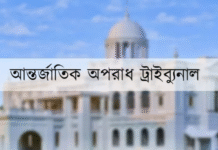
The country’s apex trade body is unlikely to be reformed with no hope of direct election to its key posts in the near future, suggest the latest steps by the government and business leaders.
As the common businessmen’s demand for election of their representatives through direct ballot is not met, two business leaders have been active to secure blessings from the ruling party high-ups to become the next president of Federation of Bangladesh Chambers of Commerce and Industry (FBCCI), chamber sources said.
To reform the FBCCI, the government assigned a committee which has not, however, come up with any radical suggestion for holding direct elections immediately despite such a demand from the business community.
An FBCCI board meeting has been convened to form a board for holding the election of the FBCCI committee for the 2017-2019 tenure in May.
The commerce ministry formed the committee on 5 April 2016, headed by former president of FBCCI Salman F Rahman, also the private sector development adviser to the Awami League president.
The committee finalised its recommendations after discussion with various groups. However, reforms would remain on hold for the time being, meaning whoever will secure the blessing of the government will become the president.
In other words, the businessmen said, the FBCCI is to be a commercial branch of the government.
A group called the ‘FBCCI Reforms Execution Action Committee’ which has been demonstrating with the demand for direct elections for some time now, has also arranged a discussion on this matter.
The committee convener and an FBCCI director, Md Helal Uddin, told Prothom Alo that they fear the reform process will not be executed even this time.
“We had high hopes when we heard the commerce ministry formed a committee to reform the FBCCI on the prime minister’s directive. But this decision to form an election board in a short notice makes us believe the reform will not take place,” he said.
Md Shafiul Islam Mahiuddin, a first vice president of FBCCI and former BGMEA president, and Md Jasim Uddin, a former first vice president of FBCCI, are seeking the government’s blessing to become the next president, chamber leaders said.
The FBCCI is comprised of 81 chambers and 382 associations. A number of 2,230 people can vote. They can elect 32 posts out of 52, the rest are nominated, according to the current system. These elected and nominated directors elect the FBCCI’s president and two presidents.
Former commerce minister Amir Khosru Mahmud Chowdhury played the critical role in changing the trade body’s rules in 2002 and started the present system of election. Before 2002, the president, two vice-presidents and also the directors were elected by direct votes.
Former FBCCI presidents Abdul Awal Mintoo, Mir Nasir Hossain, Annisul Huq, AK Azad, Kazi Akram Uddin and Abdul Matlub Ahmad — all pledged reforms and direct election in the FBCCI, but nothing happened.
The trade organisations are now running under the rules formed in 1961. The commerce ministry took initiatives to formulate a new law, which was reviewed in 2013, but could never make its way to parliament.
One of the FBCCI leaders said most of the leaders in the federation are supporters of the Awami League. In addition to that, the government decided who are going to be the directors in 20 posts; so it is very important to have the support of the government.
The recommendations of Salman F Rahman say there should be 60 posts for the directors. They will be elected. But 24 posts for the directors will be reserved for 24 prime business organisations. FBCCI president and two vice-presidents will be elected by the presidents of product-based associations and chambers, but nothing was said about reforms in the FBCCI.
“We want direct election so that nominated directors can be elected from the organisation. Election must take place everywhere. But we need nominated directors; otherwise, bigger organisations do not get elected,” said Salman F Rahman.
*The article originally published in Prothom Alo is rewritten in English by Sitesh Kumar Saha and Khawaza Main Uddin
Source: Prothom Alo









